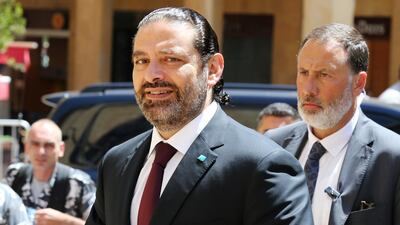Staff of a television channel owned by Lebanese Prime Minister Saad Hariri's family have gone on an indefinite strike over unpaid wages, employees told The National.
“We have been struggling for nearly a decade and now cannot wait any longer,” said Ghida Majzoub, a prominent anchor who was one of the first presenters on Future TV after its launch in February 1993 by Rafiq Hariri, the prime minister's late father.
“No one can afford working at Future TV anymore," said another employee, who asked to remain anonymous to avoid compromising negotiations with the management. He said he was owed 35 months of arrears while the minimum backlog among staff was 15 months of unpaid wages.
The strike started on July 30 when journalists replaced news bulletins with re-runs of old shows, and this was extended to all programming the next day. News makes up about 30 per cent of the channel's content, with the rest being morning shows, talks show and celebrity news.
Most Lebanese media are financed by politicians, so when Rafiq Hariri was assassinated in a car bombing in 2005 while prime minister, the political crisis that ensued deeply affected his television network, said the employee.
Salaries started being delayed but the staff stayed on out of loyalty to Saad Hariri, who took over leadership of the Future Movement party after his father’s death. The following years saw a decline in interest from the party’s traditional financial backers.
“During the parliamentary elections of 2009, a lot of effort was put into the political campaign but the TV did not receive sufficient funds,” the employee said.
In early 2017, the company cut costs by forcing nearly half of its full-time staff to work as freelancers, meaning they would lose benefits such as social security, sick leave and paid holidays. “We had no choice but to sign even if it was not good for us," said Mrs Majzoub, who was one of those affected. "After that, the situation just got worse. We are now paid half a salary every month and a half.”
In May, staff sent a warning to the management by cancelling the 3pm news bulletin for one day. “This triggered lots of meetings and the administration promised to come back with a solution by the end of July. The deadline passed, so the strike started,” said the employee, who criticised the management’s handling of the crisis.
“We have received no explanation, no emails, nothing, since the beginning of the strike,” said Mrs Majzoub.
General manager Ramzi Jbeily would not comment but said an official statement would be released later this week, before the Eid Al Adha celebrations set to start on Sunday.
Over the years, Saad Hariri repeatedly promised the station’s staff that they would eventually be paid, sending signals that he appreciated their patience and support, the employee said. “There’s a bit of a Stockholm syndrome among employees. They feel guilty for Hariri, because they know he’s facing pressure from all sides, and they don’t want his financial problems to be exploited by his political opponents,” he said.
Mr Hariri's party lost ground to the Iran-backed Hezbollah group and its allies in elections last year, while his family's business empire created by his father is under financial strain, with its real estate company Saudi Oger shutting down two years ago. The Hariri family-affiliated newspaper Al Moustakbal closed its print edition in late January and now only publishes online.
"At some point Hariri needs to understand that this is about his image as prime minister," Ayman Mhanna, director of the Lebanese media watchdog SKeyes, told The National.
Mr Mhanna said the crisis at Future TV was a symbol of Lebanese media’s broken business model. “The media sector’s income is not connected to audience or advertising revenues. It depends on support from individuals, parties and foreign countries. In their absence, almost no media outlet in Lebanon can pay salaries or administrative expenses," he said.
Several Lebanese newspapers had to close down recently due to financial difficulties, such as political daily Al Anwar in September last year. In 2016, As-Safir printed its final edition 42 years after it was founded.
To become a sustainable business, Future TV will have to reinvent itself to adapt to consumer demand, said the employee. “There’s a lot of ego. TV owners are living in the past, when Lebanon was the number one media hub in the region."
But traditional media's attempts to adopt online models have failed so far, said Mr Mhanna. "The online version of Al Moustakbal shows they have a very poor understanding of what online media is. The website is static, with no value added or interest paid to multimedia interaction. If the [Future] TV follows the same pattern, it would be very sad."

